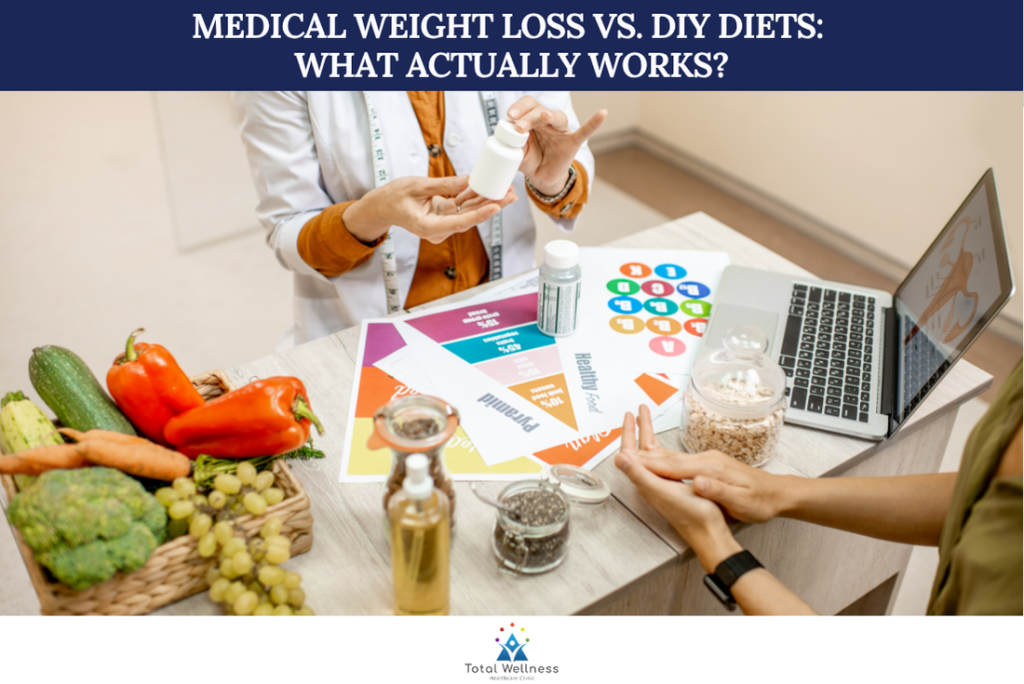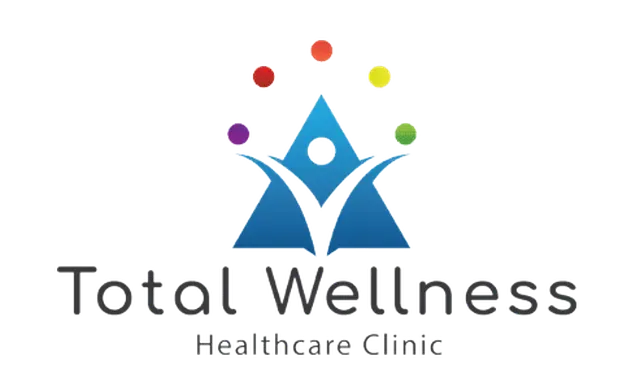 Losing weight can feel like an uphill battle. With so many diet trends, online workouts, and supplements claiming quick results, it’s hard to know what actually works. While do-it-yourself (DIY) diets often promise fast fixes, they rarely offer long-term success. In contrast, medical weight loss programs take a scientific, individualized approach led by healthcare professionals to ensure safe, sustainable results.
Losing weight can feel like an uphill battle. With so many diet trends, online workouts, and supplements claiming quick results, it’s hard to know what actually works. While do-it-yourself (DIY) diets often promise fast fixes, they rarely offer long-term success. In contrast, medical weight loss programs take a scientific, individualized approach led by healthcare professionals to ensure safe, sustainable results.
At Your Total Wellness Clinic, we help patients achieve their weight loss goals through doctor-supervised weight loss plans tailored to your unique body, lifestyle, and health needs. In this article, we break down the key differences between DIY diets and medical weight loss programs, and explain why working with a weight loss clinic might be the most effective strategy for long-term success.
What Is Medical Weight Loss?
Medical weight loss refers to weight management guided by licensed healthcare professionals, such as physicians, nurse practitioners, or registered dietitians. These programs are designed to address the root causes of weight gain, including:
- Hormonal imbalances
- Metabolic issues
- Chronic conditions (like diabetes or thyroid dysfunction)
- Emotional or behavioral eating patterns
Medical weight loss may include:
- Nutrition counseling
- Prescription medications or injections (such as GLP-1 agonists)
- Exercise plans
- Ongoing health monitoring
Unlike fad diets, medical programs are data-driven, evidence-based, and customized to your body and lifestyle.
What Are DIY Diets?
DIY diets are plans you start on your own, without the guidance of a medical professional. They can include:
- Trendy meal plans (Keto, Paleo, Intermittent Fasting)
- Commercial programs (WW, Noom, SlimFast)
- Fitness and nutrition apps
- Social media advice
While some people may lose weight initially, DIY diets often:
- Lack personalization
- Are hard to maintain long-term
- Don’t address underlying medical conditions
- Can cause nutritional deficiencies or health risks if misapplied
Medical Weight Loss vs. DIY Diets: Key Differences
| Feature | Medical Weight Loss | DIY Diets |
| Supervision | Doctor or clinician-guided | Self-guided |
| Customization | Based on labs, health history, and body composition | One-size-fits-all |
| Safety | Monitored for side effects and health markers | Risk of over-restriction or side effects |
| Sustainability | Focused on long-term success | Often short-term or yo-yo results |
| Support | Ongoing accountability and follow-ups | Limited or no support |
Why DIY Diets Often Fail
Studies show that most people regain the weight lost from a DIY diet within 1-2 years. Common reasons include:
- Unsustainable restrictions
- Lack of accountability
- Ignoring emotional or mental health aspects of eating
- Plateauing metabolism
Without clinical support, it’s also easy to overlook medical conditions like insulin resistance or hormone imbalances that hinder weight loss.
The Advantages of Medical Weight Loss Programs
1. A Holistic View of Your Health
Medical weight loss looks at more than the number on the scale. Your doctor will evaluate:
- Lab results (blood sugar, cholesterol, thyroid)
- Blood pressure and heart health
- Mental health and stress levels
- Sleep quality and lifestyle factors
2. Access to Prescription Weight Loss Medications
When appropriate, FDA-approved medications or injections can help suppress appetite, regulate blood sugar, or boost metabolism under medical supervision.
3. Ongoing Support and Adjustments
You won’t be left to figure it out on your own. Your plan will be monitored and adjusted as your body changes, ensuring better results and fewer setbacks.
4. Behavioral and Emotional Coaching
You’ll receive tools to manage emotional eating, develop healthy habits, and build a sustainable routine that fits your lifestyle.
Is Medical Weight Loss Right for You?
You might be a good candidate for medical weight loss if you:
- Have tried multiple diets without lasting success
- Struggle with weight-related health conditions
- Are unsure about what or how to eat
- Need medical supervision due to medications or health concerns
- Are looking for a long-term solution
What to Expect at a Weight Loss Clinic
At Your Total Wellness Clinic, our process includes:
- Initial Consultation — Review your health history, lifestyle, and goals
- Comprehensive Testing — Blood work, weight, BMI, and metabolism assessments
- Personalized Plan — Nutrition, fitness, and (if needed) medications
- Ongoing Support — Regular check-ins, tracking progress, and adjusting the plan
Success Stories: Real Patients, Real Results
Many of our patients lose 15-50 pounds and keep it off with our medically supervised weight loss program. Beyond the scale, they report:
- Improved energy
- Lower blood pressure
- Reduced medication use
- Better sleep and mood
Ready to Try a Smarter Approach to Weight Loss?
Don’t let frustration or misinformation hold you back. Our team at Your Total Wellness Clinic offers the support, expertise, and tools you need to reach your goals safely and sustainably.
Book a consultation today and discover the difference of doctor-supervised weight loss.
Your Total Wellness Clinic — Because Your Weight Loss Journey Deserves Medical Expertise.
